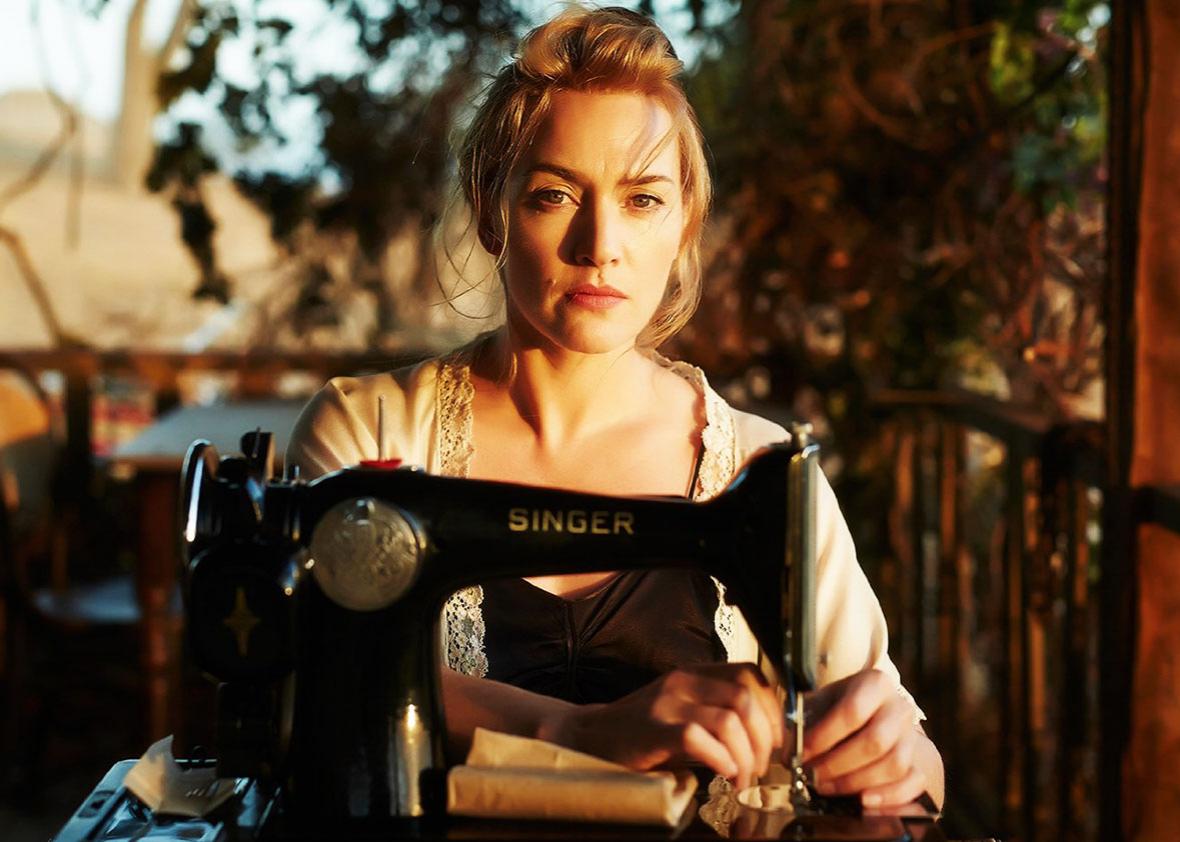The Dressmaker starts off with one of the most promising opening scenes you could possibly ask for: In the dead of night, Kate Winslet, in an impeccably tailored travelling coat and perilously tilted hat, sizes up the dusty hick town she’s set foot in and plucks a cigarette from its case. “I’m back, you bastards,” she purrs, looking every inch a femme fatale, a stream of smoke escaping her perfectly crimsoned lips.
It’s been nearly 20 years since Australian filmmaker Jocelyn Moorhouse has sat in the director’s chair, her last foray, A Thousand Acres, having been widely panned as “contrived” and “sentimental.” Since then, Moorhouse, whose 1991 debut Proof introduced American audiences to both Hugo Weaving and Russell Crowe, has tried her hand at theater and served as producer on a few of husband P.J. Hogan’s films, but for the most part, she’s kept a relatively low profile. Now, though, she’s back (you bastards) with The Dressmaker, a visually stunning, dizzyingly genre-defying adaptation of the novel by Rosalie Ham.
The Dressmaker kicks off with the homecoming of Myrtle “Tilly” Dunnage (Winslet), a sophisticated clothing designer returning to the Australian backwater of Dungatar after being cast out as a child for allegedly killing a schoolmate, a crime she barely remembers. While the years and a well-tailored wardrobe have transformed Tilly from duckling to swan, not much has changed in Dungatar: not the uptight, sadistic schoolteacher who served as chief witness against her (Kerry Fox); not the plain, sullen shopkeeper’s daughter who sold her down the river when they were kids (Sarah Snook); and certainly not the father of the boy she killed (Shane Bourne), a town councilor with some nasty secrets and an extremely disturbing domestic life.
Even Tilly’s mother, a neglected, scraggly-haired coot played by Judy Davis, isn’t happy to see her, hissing “murderess” whenever she has the chance—which is often, since Tilly has come home to keep an eye on her. Though they’re few and far between, there also are a few good eggs in town: Weaving, for one, plays the local sergeant, who secretly cross-dresses in private and who can’t resist the allure of Tilly’s box of textiles, while Liam Hemsworth plays a “footy” star who wants nothing more than to sweep the glamorous Tilly off her feet.
Moorhouse has described The Dressmaker as “Unforgiven with a sewing machine,” but despite managing to rack up an impressive enough body count, that’s not an entirely apt description, since Tilly, our fashionista, never really seems all that interested in either redemption or revenge—just answers, really. And while she’s sniffing out the truth about what happened 25 years ago and resisting the lure of Hemsworth’s abs, she also gives the ungrateful town a makeover—The Dressmaker’s costumes are unsurprisingly stunning, with wardrobes so central to the movie as a whole that it required not one but two costume designers: one for Tilly’s outfits and one for everyone else’s.
The film flits so dramatically between genres—one minute a romantic comedy, the next a whodunit, and then suddenly, in the film’s most disturbing and genuinely gut-wrenching scene, a bona fide tragedy—that it’s enough to give you emotional whiplash. Before its third-act plunge into despair, Moorhouse gives us a lot to laugh at: The townsfolk, who for the most part are an already unlikable lot, are made only more vain and insufferable by Tilly’s finery, which results in a wickedly funny set piece in which the women of the town peacock in chiffon capes and plunging necklines while changing lightbulbs and milling about on decrepit, dusty porches. Weaving gives a delightful performance, not afraid to play up the flamboyant nature of his character and looking just as at home in a skirt as he did decades ago in The Adventures of Priscilla, Queen of the Desert, while Hemsworth’s Teddy is a big-hearted, loose-limbed Prince Charming through and through, often nobly, and knowingly, taking his shirt off to fluster Tilly and delight her mother. (Whoever is encouraging the Hemsworth brothers to choose roles that use them as eye candy, I applaud her.)
One of The Dressmaker’s final shots recalls its first, with Winslet superbly decked out in haute couture against an unlikely backdrop, looking grimly into the distance, a cigarette in hand, as she finally exacts her revenge. Every baddie gets his or her comeuppance, some of them gruesomely, and after everything Tilly goes though in the third act (to say nothing of the audience), it’s certainly gratifying to watch.
But Moorhouse doesn’t end the film on that supremely satisfying moment. One final beat with Winslet feels less like a happy ending and more of a poignant moment of reflection, managing to be smug, sad, and stylish all at once. The Dressmaker may be a revenge comedy, but it never quite conforms to our expectations of what that should mean. And that seems to be exactly how Moorhouse wants it.
